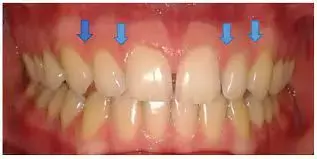- Home
- Medical news & Guidelines
- Anesthesiology
- Cardiology and CTVS
- Critical Care
- Dentistry
- Dermatology
- Diabetes and Endocrinology
- ENT
- Gastroenterology
- Medicine
- Nephrology
- Neurology
- Obstretics-Gynaecology
- Oncology
- Ophthalmology
- Orthopaedics
- Pediatrics-Neonatology
- Psychiatry
- Pulmonology
- Radiology
- Surgery
- Urology
- Laboratory Medicine
- Diet
- Nursing
- Paramedical
- Physiotherapy
- Health news
- Fact Check
- Bone Health Fact Check
- Brain Health Fact Check
- Cancer Related Fact Check
- Child Care Fact Check
- Dental and oral health fact check
- Diabetes and metabolic health fact check
- Diet and Nutrition Fact Check
- Eye and ENT Care Fact Check
- Fitness fact check
- Gut health fact check
- Heart health fact check
- Kidney health fact check
- Medical education fact check
- Men's health fact check
- Respiratory fact check
- Skin and hair care fact check
- Vaccine and Immunization fact check
- Women's health fact check
- AYUSH
- State News
- Andaman and Nicobar Islands
- Andhra Pradesh
- Arunachal Pradesh
- Assam
- Bihar
- Chandigarh
- Chattisgarh
- Dadra and Nagar Haveli
- Daman and Diu
- Delhi
- Goa
- Gujarat
- Haryana
- Himachal Pradesh
- Jammu & Kashmir
- Jharkhand
- Karnataka
- Kerala
- Ladakh
- Lakshadweep
- Madhya Pradesh
- Maharashtra
- Manipur
- Meghalaya
- Mizoram
- Nagaland
- Odisha
- Puducherry
- Punjab
- Rajasthan
- Sikkim
- Tamil Nadu
- Telangana
- Tripura
- Uttar Pradesh
- Uttrakhand
- West Bengal
- Medical Education
- Industry
AI may identify specific sites with and without gingival inflammation as accurately as visua examination by human

Gingivitis is one of the most prevalent plaque-initiated dental diseases globally. It is challenging to maintain satisfactory plaque control without continuous professional advice.
Researchers have found in a new study that Artificial intelligence could accurately identify specific sites with and without gingival inflammation that are on par with visual examination by human dentist.
The new study published in the International Journal of Dentistry.
Gingivitis is one of the most prevalent plaque-initiated dental diseases globally. It is challenging to maintain satisfactory plaque control without continuous professional advice. Artificial intelligence may be used to provide automated visual plaque control advice based on intraoral photographs.
Frontal view intraoral photographs fulfilling selection criteria were collected. Along the gingival margin, the gingival conditions of individual sites were labelled as healthy, diseased, or questionable. Photographs were randomly assigned as training or validation datasets. Training datasets were input into a novel artificial intelligence system and its accuracy in detection of gingivitis including sensitivity, specificity, and mean intersection-over-union were analysed using validation dataset. The accuracy was reported according to STARD-2015 statement.
Results
A total of 567 intraoral photographs were collected and labelled, of which 80% were used for training and 20% for validation. Regarding training datasets, there were total 113,745,208 pixels with 9,270,413; 5,711,027; and 4,596,612 pixels were labelled as healthy, diseased, and questionable respectively. Regarding validation datasets, there were 28,319,607 pixels with 1,732,031; 1,866,104; and 1,116,493 pixels were labelled as healthy, diseased, and questionable, respectively. AI correctly predicted 1,114,623 healthy and 1,183,718 diseased pixels with sensitivity of 0.92 and specificity of 0.94. The mean intersection-over-union of the system was 0.60 and above the commonly accepted threshold of 0.50.
Conclusions
Artificial intelligence could identify specific sites with and without gingival inflammation, with high sensitivity and high specificity that are on par with visual examination by human dentist. This system may be used for monitoring of the effectiveness of patients’ plaque control.
Reference:
Reinhard Chun Wang Chau, Guan-Hua Li, In Meei Tew, Khaing Myat Thu, Colman McGrath, Wai-Lun Lo, Wing-Kuen Ling, Richard Tai-Chiu Hsung, Walter Yu Hang Lam. Accuracy of Artificial Intelligence-Based Photographic Detection of Gingivitis, International Dental Journal, 2023, ISSN 0020-6539, https://doi.org/10.1016/j.identj.2023.03.007.
(https://www.sciencedirect.com/science/article/pii/S0020653923000606)
Dr. Shravani Dali has completed her BDS from Pravara institute of medical sciences, loni. Following which she extensively worked in the healthcare sector for 2+ years. She has been actively involved in writing blogs in field of health and wellness. Currently she is pursuing her Masters of public health-health administration from Tata institute of social sciences. She can be contacted at editorial@medicaldialogues.in.
Dr Kamal Kant Kohli-MBBS, DTCD- a chest specialist with more than 30 years of practice and a flair for writing clinical articles, Dr Kamal Kant Kohli joined Medical Dialogues as a Chief Editor of Medical News. Besides writing articles, as an editor, he proofreads and verifies all the medical content published on Medical Dialogues including those coming from journals, studies,medical conferences,guidelines etc. Email: drkohli@medicaldialogues.in. Contact no. 011-43720751


